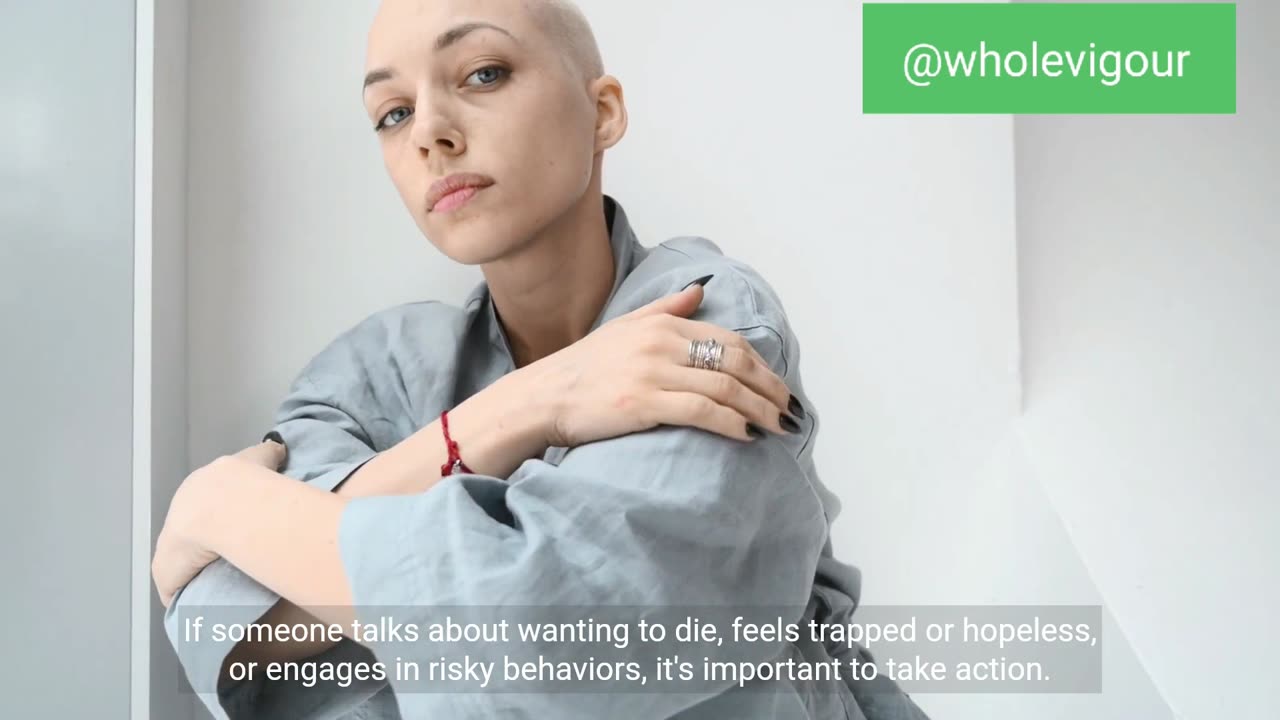Premium Only Content

The Relationship Between Bipolar Disorder And Suicide
A psychiatric condition known as bipolar disorder causes mood swings that oscillate between euphoric highs (mania) and protracted lows (depression). In comparison to those without the illness, it is also linked to a higher rate of suicide thoughts and actions, according to study.
A review that was published in August 2019 in Medicina found that the suicide rate for those with bipolar disorder is 10 to 30 times greater than the general population. According to the same analysis, 20 to 60 percent of people with bipolar disorder attempt suicide at least once in their lives and 20 percent of them die by suicide.
Why Is Suicide More Common among People With Bipolar Disorder?
Individuals may experience deep grief, hopelessness, and a loss of interest in once-enjoyed activities during depressive episodes. These signs can raise the risk of suicide thoughts, together with potential functional impairment and disturbed sleep patterns.
Other potential symptoms of depressive episodes, include:
*Appetite changes, resulting in unintentional weight loss or gain
*Fatigue or lack of energy
*Slowed movements or restlessness
*Difficulty concentrating or making decisions.
Importantly, most deaths by suicide happen among people whose bipolar disorder is untreated. The longer bipolar disorder goes untreated, the higher the risk for suicide.
Other risk factors for suicide among those who have bipolar disorder include:
*Prior suicide attempts
*A family history of mental illness or prior suicide attempts
*A recent hospital discharge;
*A history of frequent prior hospitalisations;
*A recent diagnosis of bipolar disorder; *Coexisting mental or physical health issues;
*A history of substance use disorders;
*Bipolar disorder with a predominance of depressive episodes
*Being single, divorced, or having no children. *Living in social isolation.
*Unemployment
*Prior abuse, trauma, or adversity
Warning Signs of Suicidal Thoughts Among Bipolar Disorder Patients.
People with bipolar disorder and the general population both exhibit similar warning signals of suicide ideation. Typical red flags that someone is contemplating suicide include:
1. Talking about wanting to die
2. Expressing remorse or feeling like a burden to others
3. Feeling trapped, hopeless, empty, or as though there is no reason to live
4. Feeling irritated, nervous, or furious
5,Extreme grief or discomfort
6, Isolation from family and friends
7, Making final arrangements for loved ones or writing a will without apparent justification
8, Suffering from severe mood swings
9, Increasing their usage of drugs or alcohol, 10, Engaging in risky behaviours including hazardous driving
11, Sleeping more or less than usual
12, Making a plan or researching ways to die
Suicide Risk Management Strategies for Bipolar Patients.
1. Continue receiving treatment for bipolar disorder
The most popular evidence-based therapies for bipolar illness include:
a, Medication
Antipsychotics or mood stabilisers, for example, can help you balance your moods and lessen the symptoms of bipolar disorder both immediately and over time.
b, Psychotherapy
You can learn how to control triggers and challenging emotions and develop coping mechanisms for your bipolar symptoms by participating in psychotherapy, commonly referred to as "talk therapy," with a qualified mental health practitioner.
c, Hospitalisation
You might require psychiatric care in a hospital if you're acting dangerously, feeling suicidal right now, or start to experience psychosis.
d, Support Groups
You can connect with others experiencing similar difficulties in your life by joining a support group for people with bipolar disorder.
2. Restrict Access to Suicide-Related Tools.
In order to keep people safe, access to weapons like rifles that they might use to end their lives can be severely restricted. It has been demonstrated that removing access to guns can lower the likelihood of suicide.
3. Establish a Safety Plan With Your Therapist or Close Family Members.
A solid safety plan should contain actions that the individual chooses in advance they or a loved one will do if they feel suicidal, such as visiting an emergency room or knowing who to call in an emergency.
How to Get Urgent Help if You're Having Suicidal Thoughts
It's critical to know when and how to get assistance while facing a crisis. Family members should be aware of local mental health resources and emergency hotlines, and they should have a plan in place for how to get rapid professional help if necessary. Call 911 if you think someone you care about or yourself is in immediate danger of committing suicide. you can also access the 988 Suicide and Crisis Lifeline at any time by phoning or texting 988.
-
 2:39
2:39
BIG NEM
8 hours agoHygiene HORROR: The "Yurt Incident"
431 -
 3:19:21
3:19:21
Price of Reason
11 hours agoHollywood Celebrities FLEE the US After Trump Win! Wicked Movie Review! Gaming Journos MAD at Elon!
53.1K17 -
 3:55:45
3:55:45
Alex Zedra
6 hours agoLIVE! Last Map on The Escape: SCARY GAME.
60.7K3 -
 1:14:07
1:14:07
Glenn Greenwald
11 hours agoComedian Dave Smith On Trump's Picks, Israel, Ukraine, and More | SYSTEM UPDATE #370
160K166 -
 1:09:07
1:09:07
Donald Trump Jr.
14 hours agoBreaking News on Latest Cabinet Picks, Plus Behind the Scenes at SpaceX & Darren Beattie Joins | TRIGGERED Ep.193
199K566 -
 1:42:43
1:42:43
Roseanne Barr
9 hours ago $58.95 earnedGod Won, F*ck You | The Roseanne Barr Podcast #75
82.1K178 -
 2:08:38
2:08:38
Slightly Offensive
11 hours ago $34.23 earnedDEEP STATE WINS?! Matt Gaetz OUSTED as AG & Russia ESCALATES War | Guest: The Lectern Guy
72.9K30 -
 1:47:36
1:47:36
Precision Rifle Network
10 hours agoS3E8 Guns & Grub - the craziness continues
57.5K4 -
 41:37
41:37
Kimberly Guilfoyle
12 hours agoPresident Trump Making all the Right Moves,Live with Border Union Chief Paul Perez & Lawyer Steve Baric | Ep. 176
147K44 -
 19:38
19:38
Neil McCoy-Ward
14 hours agoMASS LAYOFFS Have Started... (How To Protect Your Income)
55.5K9